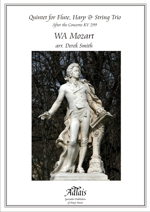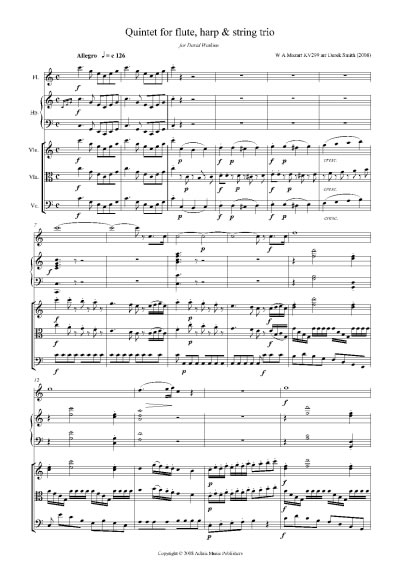 |
|||
| |
of Harp Music |
| © 2004-2025 ADLAIS |
| Quintet
for Flute, Harp & String Trio After the Concerto KV 299. WA Mozart (1756-1791) arr. Derek Smith |
return to previous page |
 |
Work: | Single work for Flute, Harp & String Trio |
| Catalogue No: | Adlais 146 | |
| ISMN: | 979-0-57032-130-8 (set) | |
| Edition: | July 2008, A4 stapled, score and set of parts | |
| Duration: | c. 22' 10" minutes | |
| Suitable for: | Advanced chamber ensemble | |
| Price:: | £20.00 Go to shop | |
| See all Adlais Publications by Derek Smith | ||
NEWS & REVIEWS
Annual Wolfgang Amadeus Mozart Memorial Concert. Kjarvalsstadir, Reykjavik, Iceland 27 January 2009
Derek Smith's Quintet for Flute, Harp & String Trio was performed at this annual concert which marks the birth of WA Mozart on 27 January 1756. The programme also included Divertimento KV 563 for violin, viola and cello, Quartet for flute and strings in C-major KV Anh. 171 (285b). The musicians were Laufey Sigurðardóttir, Þórunn Ósk Marinósdóttir, Sigurður Bjarki Gunnarsson, Martial Nardeau and Elísabet Waage. Clarinet player Einar Jóhannesson talked about the composer and the pieces.
“…The best piece was the Quintet in C major which was a world premiere of an arrangment by Derek Smith of the Concerto for flute, harp and orchestra. The arrangement uses 3 string players as an orchestra. They succeded in forming a suiteble frame around Elísabet’s Waage harp playing that was rich of feeling. Here the harp was not drowned as tends to happen with a whole orchestra. No, Derek Smith’s arrangement was both tasteful and inventive, even better than the original!......”
Jónas Sen writing in the Icelandic newspaper Morgunbladid.
'Carolingua', Derek Smith's composition for String Quartet and Four Soprano Voices, was awarded first prize in the Henschel String Quartet / BBC Music Magazine's Henschel String Quartet competition 2009. It is to be featured on a CD of Christmas music with the Henschel Quartet and the famous Toelzer Knabenchor.
Mozart’s Flute & Harp “Quintet”
Composed in Paris in April 1778, Mozart's Concerto was written for Adrien-Louis de Bonnières, Duc de Guines, and his harpist daughter, Marie-Louise Philippine, who was Mozart's composition student. It features the then new multi-keyed flute with extended register down to D flat and C natural, exploited gleefully in the first movement, the bottom ‘C’ also appearing in the other movements. Though popular with audiences, the work is expensive to put on and in some resonant acoustics there can be balance problems. The nineteenth-century chamber literature contains a number of attractive French works for flute, harp & solo strings. This gave me the idea of arranging the Concerto as a companion piece for intimate performance.
In order to realise a true chamber music
texture, I felt it was not enough merely to score the orchestra part
for string trio; neither would this have been musically or technically
effective. Conversion from a display to an ensemble piece led to my
omitting the usual cadenzas (not by Mozart, in any case) and their
orchestral harbingers. Otherwise I was able to preserve almost all
of Mozart’s solo writing while introducing flute and harp elsewhere
where needed as ripieno instruments. To avoid textural fatigue, players
and listeners are given relief in this quintet version through rescoring
a few flute phrases for strings.
D.A.S
About the Arranger
Derek Smith’s musical career
started as a schoolboy at University College School inspired by the
formidable Richard Chanter D Mus, FRCO, who interspersed his instruction
in four-part harmony and counterpoint with impromptu renderings of
Brahms Lieder in a reedy baritone with self-accompaniment. Derek was
also much influenced by a school friend Geoffrey Elkan, clarinettist
and later a prime mover in promoting Jewish-Arab collaboration through
music. At school, he had the opportunity to learn and play several
wind instruments and to compose, winning at the age of 17 the school
music composition prize with (of course!) a symphony in one movement
which was duly performed by the school orchestra, this piece being
much influenced by Beethoven 1. It was received by the poor captive
parents with great loyalty but modified rapture.
After playing brass in the Chelsea Symphony and National Youth Orchestras, to please his father, a distinguished research scientist, he studied for a chemistry degree at UCL, financed largely through free-lance playing including trombone in Forte’s café interspersed with solo tuba in Arthur Benjamin’s ballet “Orlando the Marmalade Cat”. He also learned a lot about musical phrasing while playing for Colin Davis, particularly in the Kalmar orchestra and Chelsea Opera Group. When offered permanent work with the Royal Philharmonic Orchestra, Derek refused it, having decided not to spend his life as a professional player. Instead, he worked as a scientist and studied conducting with Norman Del Mar, acting as his assistant at the Croydon Symphony Orchestra. He was assistant conductor of the Modern Symphony Orchestra (often directed by its genial president, Sir Adrian Boult), and took composition lessons with Malcolm Arnold who was a supportive mentor as well as a master of instrumentation. At Music Camp, he gained valuable experience in conducting large-scale works including Wagner operas with professional casts of singers.
For twenty years, he played horn in a wind quintet, and for more than a decade ran his own wind ensemble as conductor and arranger. Being also a primitive doublebass player and a bumbling cellist, he learned about writing for strings, particualrly from playing (with tolerant friends) the quartets of Haydn and Mozart. One of his pleasures is to recast excellent but neglected music into more practical formats for modern performance, particularly creation of chamber works from larger ensembles. This includes a set of six string quartets based on Boyce’s Symphonies and some of Corelli’s Concerti Grossi. Derek’s other arrangements are mostly for ten-wind ensemble, published by Ariel Music, for flute & strings and particularly for oboe & three strings. Many of the latter were made at the request of solo oboist Imogen Triner and her group Oboeworks including a premiere at the International Schubertiade in Roskilde, Denmark in August 2005. Four of these pieces are played by Oboeworks on a recent CD. His original compositions include four string quartets, of which three have been performed, a three-movement piano quartet, said to be “too difficult”, some songs for soprano & wind quintet, and a Quintet for Brass instruments “Tomkins Tunes” premiered by Fine Arts Brass in 2004 and also published by Ariel. One of his most recent works “Bachorales:Concerto for ten wind & doublebass” was premiered under his direction on 8 February 2008 by ESO Winds to whom it is dedicated.

